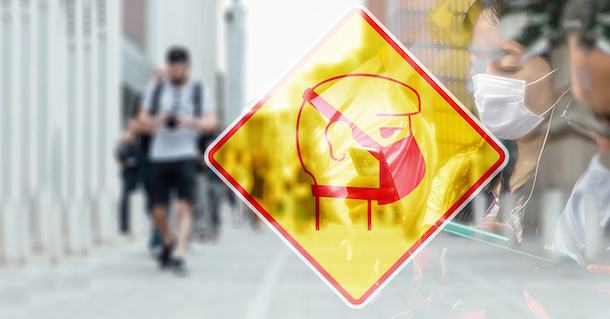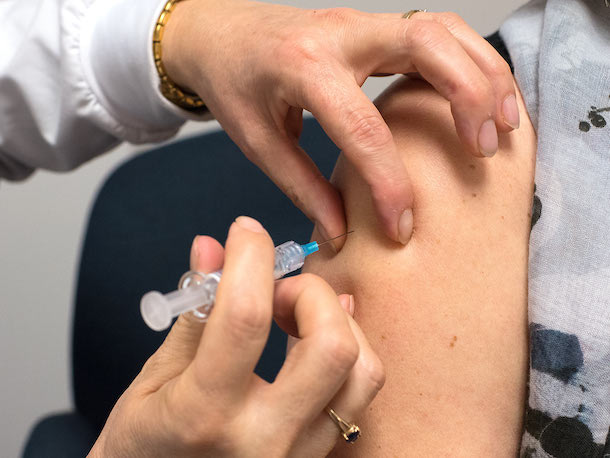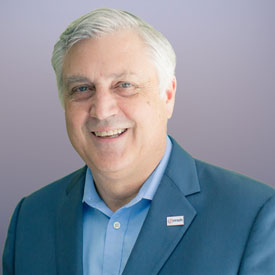Facing the Corona Virus Challenge
Air Date: Week of March 6, 2020

The novel coronavirus COVID-19 has spread to dozens of countries around the world since it was first reported to the World Health Organization on the last day of 2019. (Photo: Prachatai, Flickr, CC BY-NC-ND 2.0)
Since late 2019, the novel coronavirus has been spreading throughout the world, sparking fears that it will grow to be a global pandemic. There are comparatively few cases in the United States, but with no vaccine or anti-viral treatments, public health officials are working hard to keep it that way, even though the US has lost some 45,000 public health employees over the past decade. Dr. Jonathan Quick, a professor of Global Health at Duke University, joins Host Steve Curwood for a look at the epidemiology of COVID-19.
Transcript
DOERING: It’s Living on Earth, I’m Jenni Doering.
CURWOOD: And I’m Steve Curwood.
Quarantines, school closings, employees stuck working from home, the falling stock market. All of these disturbing events are thanks to a global wave of infection from novel coronavirus Covid-19 that has been spreading around the world since it was first reported to the World Health Organization from Wuhan China on the last day of 2019. And while now there are only a handful of countries where people are suffering and dying from this new coronavirus in large numbers fears of a global pandemic are rising. Though there’s still relatively few cases in the United States public health officials are working hard to keep it that way and there is little margin for error as there is no vaccine or antiviral medicines that seem to work against Covid-19. But for those people who do get very sick there are only limited numbers of ventilators available for intensive care. Joining us now for some background and perspective on the outbreak is former World Health Organization official Dr. Jonathan Quick. Dr. Quick is also author of the book The End of Epidemics: The Looming Threat to Humanity and How to Stop It. Dr. Quick welcome back to Living on Earth.
QUICK: Thank you, Steve. It's good to be here.
CURWOOD: You know this time of year is often called the cold and flu season since these diseases seem to make their rounds about this time of the year in the Northern Hemisphere, how does the coronavirus compare to these other illnesses?
QUICK: Well, it's similar in the sense that it's a respiratory transmission, it transmits by respiratory droplets. It has a wide variation in severity with the coronavirus, the current one, about 80% is mild and asymptomatic, but it kills very much the same way as the as the flu does. It basically gets in and breaks down your defenses in your respiratory system. And then it's typically a bacterial pneumonia that kills you in the end. That's what's doing it for the coronavirus cases. That's what's doing it for today's influenza cases. That's what did it 100 years ago for influenza.
CURWOOD: So, what will be the worst case scenario, and how likely is that outcome?
QUICK: When you get a new virus like this, there's several possible outcomes. 2003, that was the first global Coronavirus outbreak. That was the SARS outbreak, out of China, the same kind of dynamic. That virus went global, and it hit 27 countries in a matter of weeks, there was a strong rapid public health response. And it was done by July, and it hasn't come back. That's the best outcome is that the virus, that good rapid public health response, puts that dragon back in the box and we don't see it again. The next best is you get a big outbreak, you got a good vaccine, and you wipe it up then. We don't have that. So, the worst possible outcome for the coronavirus, that it gets embedded in the population around the world and it continues. And we can hope for a seasonal dynamic, that when it gets warmer and all, the disease will go down. But we have no evidence yet that that is going to be the case with coronavirus. So, the worst case is that it's it's not seasonal, it doesn't go away in the warm weather. It sticks with us and we have a tough 12 to 18 months as we work hard to get a vaccine.
CURWOOD: What is it about our coronavirus response here in the United States that is working and what's not working?
QUICK: Well, what's working, first of all, we're prepared. And we were ready to get going on things. The bad news is that there's been some early missteps. One of the most troubling is the problem of getting the test kits going. Because the question that you want to know when you've got an outbreak is where the case is, how many are there, is that number going up each day or down each day. That's how you know how you're doing. And if you can't test, you don't know. We have been in the same cycle, in this country, of panic and neglect, in terms of our funding of the basic public health preparedness systems. When there's an outbreak, you get to the point where there's fear, there's panic. Health officials and political officials want to do something. So they, you know, they pass emergency spending. They make plans, they make promises to improve the systems and all that. And then when the headlines are gone, the disease has gone away, then other things take attention. And we de-fund and de-staff. The case in point: after 9/11, back in 2001, the Congress approved a national public health emergency fund. And they funded it well. Over the next few years it started trickling down, the funding. And then, with the bird flu in the mid 2000s. It went back up again. Then it started trickling down. And with the effect of the financial crash in 2008, over a period of six years, we lost 45,000 public health professionals in the US. Because we haven't kept up on funding those preventive services and the readiness, we did not start at a point of strength, as strong as it should have been. Overall the response has been strong, good and appropriate, but nowhere near what it could have been and should have been with the right funding and continued support.

A vaccine for this strain of coronavirus, COVID-19, is unlikely to be through testing and ready for public use until next year. (Photo: Government of Prince Edward Island, Flickr, CC BY-NC-ND 2.0)
CURWOOD: When you're dealing with an outbreak like this, what do you see as a more effective path, to focus on actions taken by institutions or individuals?
QUICK: When you don't have a vaccine and you don't have an effective medicine, your defense is is basically: find and isolate the sick, quarantine the exposed, treat the sick, keep the rest of the health service going. Those first critical things, those depend heavily on public trust, public cooperation. And what we saw vividly 100 years ago was St. Louis was one of the most successful cities in the 1918 pandemic, because they had a health commissioner that brought people together, that met with the press, that engaged people. And other cities that didn't have that trust, that didn't have that communication, there was a four-fold difference in the death rates among cities in the US, in good part because of whether they were able to keep trust and confidence and cooperation with the public.
CURWOOD: So, sounds like you're saying that good institutions are much better situation than every person for him or herself.
QUICK: Absolutely.
CURWOOD: Where are we on that scale, do you think in the United States? How are public institutions? What's the level of public trust?
QUICK: At the local level, the public health departments are known and seen by the public and are doing a super job, the state health departments are, the National Institute of Health and the CDC, those are all institutions which which I think have good trust. A critical thing for the trust is clear, credible, consistent communication. And a core principle is you tell people what you know, when you know it, you tell them what you don't know and, and keep them up to date. You don't mix in hunches and all if if you're somebody that a lot of people listen to.
CURWOOD: Now, Dr. Quick every year, a flu vaccination is created in the hopes of minimizing the outbreaks of influenza. How close are we to being able to expect a vaccine for this coronavirus do you think?
QUICK: Good news is that there's well over a dozen efforts going on to develop a vaccine. We've moved the fastest we've ever moved from having a new virus to the point where we've got vaccines that are now ready to go into testing. So, we're very close on that, moving quicker, but it's still probably at least a year off before we have vaccines that are proven to be effective and safe in humans.
CURWOOD: Now, what about the treatment side here for these outbreaks? Doesn't seem that the health system is really prepared to deal with huge numbers of people all of a sudden needing treatment and management all at once. What should be done?

Dr. Jonathan Quick is a professor of Global Health at Duke University’s Global Health Institute. (Photo: Courtesy of St. Martin’s Press)
QUICK: No, yeah, that's absolutely true. You know, countries used to have it backwards in the sense they'd say, we'll invest in roads and railways and all, and then if we have enough time and money we'll invest in health and education. What we know very clearly now is those countries that invest adequately in health and education and provide universal health coverage to the population, they actually do better economically, it's a good investment. So we're under-investing in health systems around the world and and that leaves most countries unprepared. But we also need to invest in a way where our resources go to those health activities that are the best value, that save the most lives.
CURWOOD: Before you go, Doctor, any advice you want to give us on a more individual level here in the United States? People want to know, what about going to public gatherings? Should we stay away? What about using public transit? That sort of thing.
QUICK: Well, first of all, good health hygiene, hand washing. If you're sick, wash your hands before you get on the subway. But otherwise wash your hands when you when you get off. That sort of good personal public health habits. Also, look at your immunizations. I mean, pneumonia is a disease that you can get immunizations for, older ages and all. But beyond that, keep track of where the information is on your community. And if there's been no identified coronavirus at all in your community, then if you feel safe enough to get in your car and drive the car and to go out in public during flu season, I wouldn't worry about coronavirus if it's not in your community.
CURWOOD: Professor Jonathan Quick is at the Duke Global Health Institute and author of The End of Epidemics: The Looming Threat to Humanity and How to Stop It. Thanks so much for taking the time with us today. Dr. Quick.
QUICK: Thank you, Steve.
Links
Living on Earth wants to hear from you!
Living on Earth
62 Calef Highway, Suite 212
Lee, NH 03861
Telephone: 617-287-4121
E-mail: comments@loe.org
Newsletter [Click here]
Donate to Living on Earth!
Living on Earth is an independent media program and relies entirely on contributions from listeners and institutions supporting public service. Please donate now to preserve an independent environmental voice.
NewsletterLiving on Earth offers a weekly delivery of the show's rundown to your mailbox. Sign up for our newsletter today!
 Sailors For The Sea: Be the change you want to sea.
Sailors For The Sea: Be the change you want to sea.
 The Grantham Foundation for the Protection of the Environment: Committed to protecting and improving the health of the global environment.
The Grantham Foundation for the Protection of the Environment: Committed to protecting and improving the health of the global environment.
 Contribute to Living on Earth and receive, as our gift to you, an archival print of one of Mark Seth Lender's extraordinary wildlife photographs. Follow the link to see Mark's current collection of photographs.
Contribute to Living on Earth and receive, as our gift to you, an archival print of one of Mark Seth Lender's extraordinary wildlife photographs. Follow the link to see Mark's current collection of photographs.
 Buy a signed copy of Mark Seth Lender's book Smeagull the Seagull & support Living on Earth
Buy a signed copy of Mark Seth Lender's book Smeagull the Seagull & support Living on Earth

